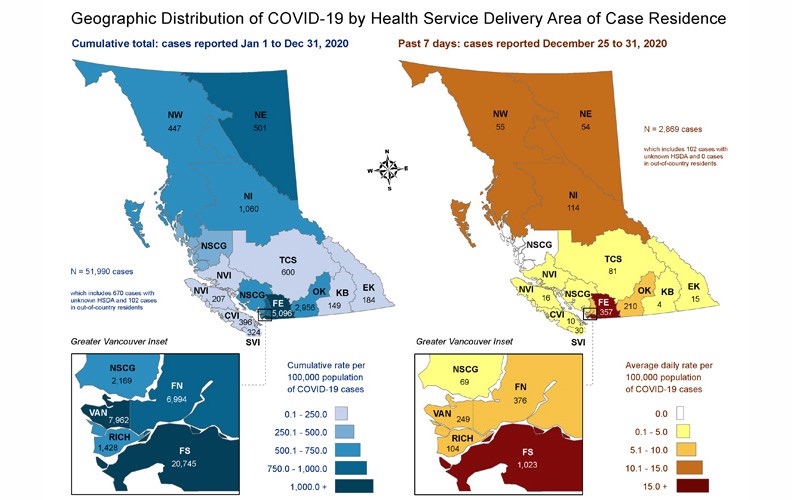Three deaths linked to COVID-19 were reported in the Northern Health region since the start of the new year, B.C. Health Minister Adrian Dix said on Monday.
The deaths in the north were three of 45 COVID-related deaths reported in B.C. since the last public update on Dec. 31. The province's death toll from the pandemic reached 946 – including 30 residents of the Northern Health region.
"For these families it was the most difficult of times," Dix said. "We are thinking of them, all of them, today."
The majority of those who died were seniors living in long-term care facilities, provincial health officer Dr. Bonnie Henry said.
According to data reported by the B.C. Centre for Disease Control on Monday, there were 169 new cases of COVID-19 in the north since Dec. 31. There were 19 people with COVID-19 hospitalized in the north, including 16 in intensive care.
The number of active cases in the north shrunk to 498, down from a peak of 581 on Dec. 31.
Across the province, there were 6,823 active cases of COVID-19, and 351 people were hospitalized with the disease – including 76 in intensive care.
Since the start of the pandemic, there have been 54,201 cases of COVID-19 in B.C., which includes 2,186 in the Northern Health region.
A map produced by the B.C. CDC with a breakdown of cases by health service delivery area showed a total of 2,017 cases of COVID-19 in the Northern Health region last year – 1,060 in the Northern Interior health service delivery area (which includes Prince George), 447 in the Northwest area and 501 in the Northeast. More than 10 per cent of those cases – 114 in the Northern Interior, 55 in the Northwest and 54 in the Northeast – were reported in the last week of the year.
As of Sunday, the seven-day average positivity rate for tests done in the Northern Health region was 17.1 per cent – nearly double the B.C. seven-day average positivity rate of 8.7 per cent.
There was a drop in the number of tests performed over the holiday period, Henry said, which wasn't unexpected.
VACCINE PLANS
As of Monday, 25,574 people in B.C. were vaccinated against COVID-19, primarily using the Pfizer vaccine, as most of the doses of the Moderna vaccine didn't arrive in the province until the last few days of December, Henry said.
Of those, roughly half were long-term care home staff members, 30 per cent were other healthcare workers and 20 per cent were long-term home residents, Henry said. In addition, small numbers of residents and staff in assisted-living facilities were also vaccinated.
Doses of the Moderna vaccine were also sent to 17 remote First Nations community in the province, Dix said.
By the end of the month, the plan is to vaccinate 150,000 people, Henry said – roughly 70,000 residents and staff of long-term care homes, 13,000 residents and staff of assisted-living homes, 30,000 health care workers, and smaller numbers of other vulnerable people including residents of remote indigenous communities, people waiting to move into long-term care homes and family members of long-term care residents considered essential visitors.
"In the first quarter of 2021, January to March, all our Pfizer vaccine will be used for those primary (at-risk) populations," Henry said. "We've made that decision to protect as many people as possible during this high-risk period."
Those plans are based on doses which Pfizer and Moderna have guaranteed to deliver during January, Henry said.
"What we have been told is the contracts for Pfizer and Moderna will scale up in March," she said.
Between February and March, Henry said the province plans to vaccinate a further 400,000 people. During that phase, the plan is to start vaccinating seniors living in the community – starting with those over 80 – along with other vulnerable populations living in communal-living situations such as people accessing homeless shelters, group homes, correctional facilities and mental health institutions.
"That is our plan for what we know for the first quarter of 2021," Henry said.
Later this month the province will release information about its plan for larger-scale immunizations for the broader public.
Health Canada is reviewing the AstraZeneca vaccine, already approved for use in the United Kingdom, and the Johnson & Johnson vaccine, Henry said. If approved, doses of those vaccines could start being delivered to B.C. in the second quarter of 2021.
The province may look to start training additional health care staff to work in immunization clinics to accelerate the campaign, she said.
"If we are looking to get to the point of herd immunity, which we are looking forward to, we will have to scale up even more," Henry said.



